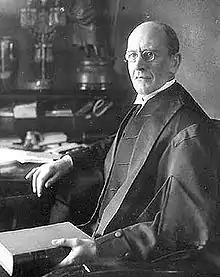William Carlos Ives
William Carlos Ives (October 30, 1873 – July 10, 1950) was a Canadian provincial politician and provincial Supreme Court Justice.
William Carlos Ives | |
|---|---|
 Ives in the 1930s, while sitting on the provincial supreme court | |
| Supreme Court of Alberta | |
| In office July 11, 1914 – August 16, 1944 | |
| Personal details | |
| Born | October 30, 1873 Compton, Quebec, Canada |
| Died | July 10, 1950 (aged 76) Calgary, Alberta, Canada |
| Nationality | Canadian |
| Alma mater | McGill University |
| Occupation | judge |
Early life
William Carlos Ives was born in Compton, Quebec on October 30, 1873.[1] His family moved to the Alberta District in the Northwest Territories shortly after he was born, to ranch near Pincher Creek in 1881.[1] Ives' father George would be one of the original members of the Northwest Mounted Police in 1879.[1] When he reached his teenage years he left home to work his first job as a cowhand. He left the territories to attend McGill University and graduated in 1899 with a Bachelor of Laws. Ives became a lawyer in Montreal shortly after graduating, being called to the bar in 1900, and worked in the city for two years before moving back to Alberta.[2][1]
Political career
Ives moved to the town of Lethbridge in 1901 and joined a legal firm partnering with established lawyer Charles Conybeare.[3] He soon became interested in provincial politics and joined the Conservatives.
Ives ran twice as a candidate for the Alberta provincial Conservative party. He ran for the first time in the Lethbridge electoral district in the 1905 Alberta general election. He was defeated by former Northwest Territories MLA Leverett DeVeber in a hotly contested race.[4]
Ives ran for a second time in the Lethbridge City electoral district. He again finished second, this time in a three way race ahead of incumbent Labor MLA Donald McNabb but was defeated by Liberal candidate William Ashbury Buchanan. Ives was unable to expand his popular vote garnering the exact total as his run for office in 1905.[5]
Judicial career
Ives left his practice in Lethbridge moving to Calgary in 1914 after he was appointed to be a judge for the Supreme Court of Alberta. He retired from his judicial career in 1944.[2] Early in his career he became known by the nickname of the "Cowboy Judge".[6]
Ives was known on the bench for his placid demeanor, and his colleagues referred to his poker face. He would rarely interrupt counsel during trial, except the occasional injection of dry humour.[1] Ives judgements were known to be short and to the point, and rarely reserved cases, and was known, and sometimes criticized for the assistance he would provide young and inexperienced lawyers in the court room.[1]
Ives presided over the scandalous seduction trial of United Farmers Premier John Brownlee. After the jury verdict came down, Ives threw out the jury decision in favour of the plaintiffs and dismissed the case; the Supreme Court of Canada eventually overturned Ives' decision The trial scandalized the United Farmers government and helped lead to its defeat in the 1935 Alberta general election.[7]
Ives would also adjudicate the infamous Powlett and Powlett v. The University of Alberta which a University of Alberta student suffered a breakdown after a brutal hazing ritual. The case was brought forward by Calgary lawyer and the victim's father Horatio Powlett and he sought $200,000 in damages. The case would be complicated as during the proceeding Ives' own son would commit suicide. He would find for the Powlett family and award them $40,000.[1][8]
Ives would also hear R. v. Solloway and R. v. Mills which the stock broker defendants from Ontario which shorted stocks they were selling to people across Canada. Ives would find both defendants guilty on charges of conspiracy, and sentenced them to four months hard labour and fined $275,000.[1]
Personal life
William Ives would marry Millicent May Troull and have two children, Bill and Elizabeth. His daughter Elizabeth would marry the son of prominent Calgarian and Senator Patrick Burns.[1]
Late life
After retiring from the judiciary, Ives remained at the Cochrane Ranch, just outside Calgary. He died in Calgary in 1950.[9][2]
References
- Knafla, Louis A. (1997). Lords of the western bench: a biographical history of the supreme and district courts of Alberta, 1876-1990. The Legal Archives Society of Alberta. pp. 76–78. ISBN 0-9681939-0-0. OL 17525532M. Retrieved September 11, 2020.
- "Justice William Ives". Alberta Heritage Foundation. Retrieved 2008-07-23.
- David Finch (November 13, 2007). "Law Society Marks 100 years of contributions to Alberta" (PDF). Calgary Herald. p. B2.
- "Lethbridge electoral district results 1905 general election". Alberta Heritage Foundation. Retrieved 2008-07-23.
- "Lethbridge City electoral district results 1909 general election". Alberta Heritage Foundation. Retrieved 2008-07-23.
- Greenwood, Frank; Beverley Boissery (2000). Uncertain Justice: Canadian Women and Capital Punishment 1754-1953. Dundurn Press Ltd. pp. 189. ISBN 1-55002-344-6.
- "Services After Seduction". Time Magazine. July 16, 1934. Retrieved 2008-07-23.
- Zdeb, Chris (October 10, 2014). "Oct. 10, 1933: Father sues U of A claiming son driven insane by inititation hazing". Edmonton Journal. Retrieved September 13, 2020.